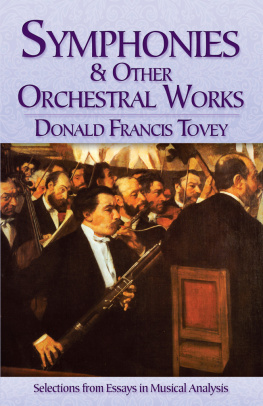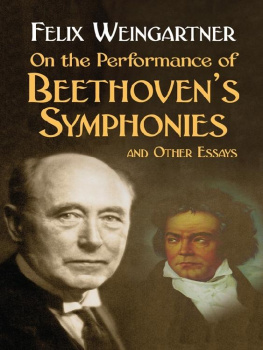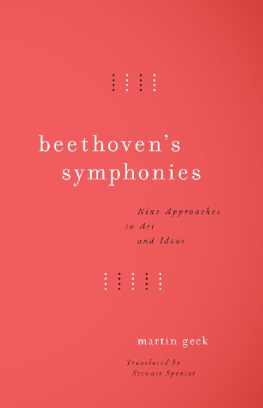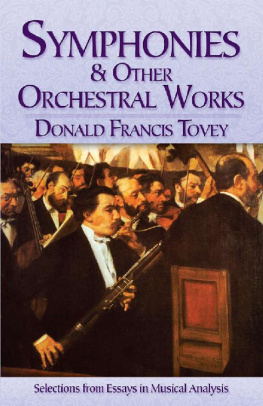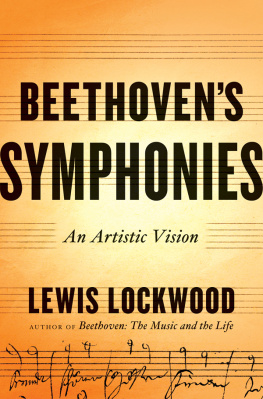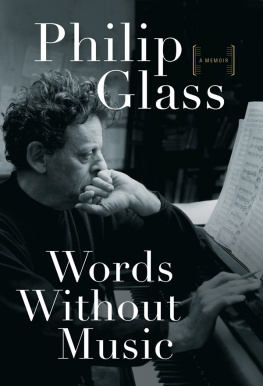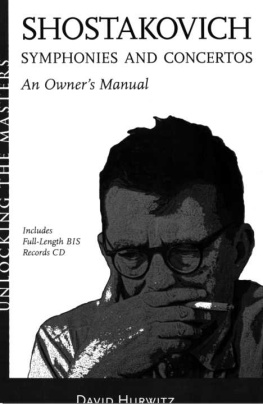H. Philip Goepp - Symphonies And Their Meaning: Modern Symphonies
Here you can read online H. Philip Goepp - Symphonies And Their Meaning: Modern Symphonies full text of the book (entire story) in english for free. Download pdf and epub, get meaning, cover and reviews about this ebook. year: 2006, publisher: IndyPublish.com, genre: Art. Description of the work, (preface) as well as reviews are available. Best literature library LitArk.com created for fans of good reading and offers a wide selection of genres:
Romance novel
Science fiction
Adventure
Detective
Science
History
Home and family
Prose
Art
Politics
Computer
Non-fiction
Religion
Business
Children
Humor
Choose a favorite category and find really read worthwhile books. Enjoy immersion in the world of imagination, feel the emotions of the characters or learn something new for yourself, make an fascinating discovery.

- Book:Symphonies And Their Meaning: Modern Symphonies
- Author:
- Publisher:IndyPublish.com
- Genre:
- Year:2006
- Rating:5 / 5
- Favourites:Add to favourites
- Your mark:
- 100
- 1
- 2
- 3
- 4
- 5
Symphonies And Their Meaning: Modern Symphonies: summary, description and annotation
We offer to read an annotation, description, summary or preface (depends on what the author of the book "Symphonies And Their Meaning: Modern Symphonies" wrote himself). If you haven't found the necessary information about the book — write in the comments, we will try to find it.
Symphonies And Their Meaning: Modern Symphonies — read online for free the complete book (whole text) full work
Below is the text of the book, divided by pages. System saving the place of the last page read, allows you to conveniently read the book "Symphonies And Their Meaning: Modern Symphonies" online for free, without having to search again every time where you left off. Put a bookmark, and you can go to the page where you finished reading at any time.
Font size:
Interval:
Bookmark:
The Project Gutenberg eBook, Symphonies and Their Meaning; Third Series, Modern Symphonies, by Philip H. Goepp
almost no restrictions whatsoever. You may copy it, give it away or
re-use it under the terms of the Project Gutenberg License included
with this eBook or online at www.gutenberg.net
Title: Symphonies and Their Meaning; Third Series, Modern Symphonies
Author: Philip H. Goepp
Release Date: July 13, 2004 [eBook #12903]
Language: English
Character set encoding: ISO-8859-1
***START OF THE PROJECT GUTENBERG EBOOK SYMPHONIES AND THEIR MEANING; THIRD SERIES, MODERN SYMPHONIES***
E-text prepared by Juliet Sutherland, Linda Cantoni,
and the Project Gutenberg Online Distributed Proofreading Team
Criticism of contemporary art is really a kind of prophecy. For the appreciation of the classical past is an act of present perception, not a mere memory of popular verdicts. The classics live only because they still express the vital feeling of to-day. The new art must do more,must speak for the morrow. And as the poet is a kind of seer, the true critic is his prophetic herald.
It is with due humility that we approach a view of the work of our own time, with a dim feeling that our best will be a mere conjecture. But we shall the more cheerfully return to our resolution that our chief business is a positive appreciation. Where we cannot praise, we can generally be silent. Certain truths concerning contemporary art seem firmly grounded in the recorded past. The new Messiah never came with instant wide acclaim. Many false prophets flashed brilliantly on the horizon to fall as suddenly as they rose. In a refracted view we see the figures of the great projected in too large dimension upon their day. And precisely opposite we fail to glimpse the ephemeral lights obscuring the truly great. The lesson seems never to be learned; indeed it can, of course, never be learned. For that would imply an eternal paradox that the present generation must always distrust its own judgment.
Who could possibly imagine in Schubert's time the sway he holds to-day. Our minds reel to think that by a mere accident were recovered the Passion of Bach and the symphonies of Schubert. Or must we prayerfully believe that a Providence will make the best prevail? And, by the way, the serious nature of this appreciation appears when we see how it was ever by the greatest of his time that the future master was heralded.
The symphony of the present age has perhaps fallen somewhat in estate. It was natural that it should rush to a high perfection in the halcyon days of its growth. It is easy to make mournful predictions of decadence. The truth is the symphony is a great form of art, like a temple or a tragedy. Like them it has had, it will have its special eras of great expression. Like them it will stay as a mode of utterance for new communities and epochs with varying nationality, or better still, with vanishing nationalism.
The tragedy was not exhausted with Sophocles, nor with Shakespeare nor with Goethe. So the symphony has its fallow periods and it may have a new resurgence under new climes. We are ever impatient to shelve a great form, like vain women afraid of the fashion. It is part of our constant rage for novelty. The shallower artist ever tinkered with new devices,to some effects, in truth. Such is the empiric course of art that what is born of vanity may be crowned with highest inspiration.
The national element will fill a large part of our survey. It marks a strange trait of our own age that this revival of the national idea falls in the very time when other barriers are broken. Ancient folk-song grew like the flower on the battle-field of races. But here is an anxious striving for a special dialect in music. Each nation must have its proper school; composers are strictly labelled, each one obedient to his national manner. This state of art can be but of the day. Indeed, the fairest promise of a greater future lies in the morrow's blending of these various elements in the land where each citizen has a mixed inheritance from the older nations.
In the bewildering midst of active spirits comes the irresistible impulse to a somewhat partisan warfare. The critic, if he could view himself from some empyraean perch, remote in time and place, might smile at his own vehemence. In the clash of aims he must, after all, take sides, for it is the tendency that is momentous; and he will be excited to greater heat the stronger the prophet that he deems false. When the strife is over, when currents are finally settled, we may take a more contented joy in the impersonal art that remains.
The choice from the mass of brilliant vital endeavor is a new burden and a source almost of dismay. Why should we omit so melodious a work as Moskowski's Jeanne d'Arc,full of perhaps too facile charm? It was, of course, impossible to treat all the wonderful music of the Glazounows and the Kallinikows. And there is the limpid beauty of the Bohemian Suk, or the heroic vigor of a Volbach. We should like to have mentioned Robert Volkmann as a later Romanticist; and Gade has ever seemed a true poet of the Scandinavian symphony.
Of the modern French we are loth to omit the symphonies of Chausson and of Dukas. In our own America it is a still harder problem. There is the masterly writing of a Foote; the older Paine has never been fully valued in the mad race for novelty. It would have been a joy to include a symphony of rare charm by Martinus van Gelder.
A critical work on modern art cannot hope to bestow a crown of laurels among living masters; it must be content with a view of active tendencies. The greatest classic has often come into the world amid least expectation. A critic in the year 1850 must need have omitted the Unfinished Symphony, which was then buried in a long oblivion.
The present author prefers to treat the main modern lines, considering the special work mainly as example. After all, throughout the realm of art the idea is greater than the poet, the whole art more than the artist,though the particular enshrinement in enduring design may reflect a rare personality.
NOTE: Especial thanks are owed to the Philadelphia Orchestra for a free use of its library, and to Messrs. G. Schirmer Company for a like courtesy.P.H.G.
.The Symphony during the Nineteenth Century
.Berlioz and Liszt
.Berlioz. "Romeo and Juliet." Dramatic Symphony
.A Symphony to Dante's "Divina Commedia"
.The Symphonic Poems of Liszt
.The Symphonic Poems of Saint-Sans
.Csar Franck
.D'Indy and the Followers of Franck
.Dbussy and the Innovators
.Tschaikowsky
.The Neo-Russians
.Sibelius. A Finnish Symphony
.Bohemian Symphonies
.The Earlier Bruckner
.The Later Bruckner
.Hugo Wolff
.Mahler
.Richard Strauss. Symphonic Poems
.Italian Symphonies
.Edward Elgar. An English Symphony
.Symphonies in America
After the long dominance of German masters of the musical art, a reaction could not fail to come with the restless tendencies of other nations, who, having learned the lesson, were yet jealous of foreign models and eager to utter their own message. The later nineteenth century was thus the age of refraction of the classic tradition among the various racial groups that sprang up with the rise of the national idea. We can see a kind of beginning in the Napoleonic destruction of feudal dynasties. German authority in music at the beginning of the century was as absolute as Roman rule in the age of Augustus. But the seed was carried by teachers to the various centres of Europe. And, with all the joy we have in the new burst of a nation's song, there is no doubt that it is ever best uttered when it is grounded on the lines of classic art. Here is a paramount reason for the strength of the modern Russian school. With this semi-political cause in mind it is less difficult to grasp the paradox that with all the growth of intercommunication the music of Europe moves in more detached grooves to-day than two centuries ago. The suite in the time of Bach is a special type and proof of a blended breadth and unity of musical thought in the various nations of Europe of the seventeenth century. In the quaint series of dances of the different peoples, with a certain international quality, one sees a direct effect of the Thirty Years' War,the beneficent side of those ill winds and cruel blasts, when all kinds of nations were jostling on a common battle-ground. And as the folk-dances sprang from the various corners of Europe, so different nations nursed the artistic growth of the form. Each would treat the dances of the other in its own way, and here is the significance of Bach's separate suites,English, French and German.
Font size:
Interval:
Bookmark:
Similar books «Symphonies And Their Meaning: Modern Symphonies»
Look at similar books to Symphonies And Their Meaning: Modern Symphonies. We have selected literature similar in name and meaning in the hope of providing readers with more options to find new, interesting, not yet read works.
Discussion, reviews of the book Symphonies And Their Meaning: Modern Symphonies and just readers' own opinions. Leave your comments, write what you think about the work, its meaning or the main characters. Specify what exactly you liked and what you didn't like, and why you think so.

